人教版英语必修五
人教版高中英语必修五Unit 5 First Aid
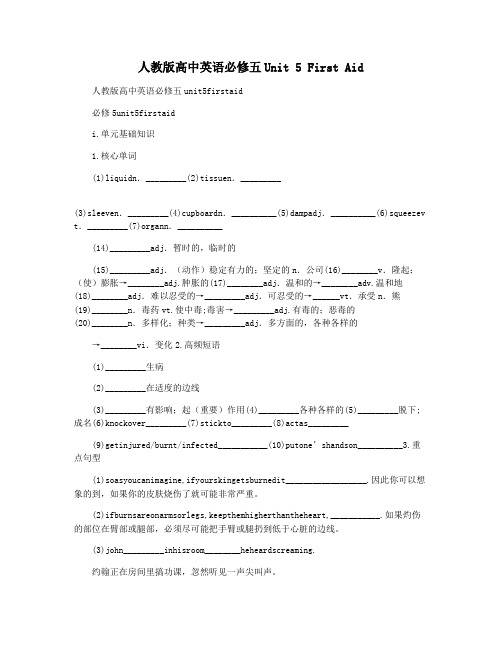
人教版高中英语必修五Unit 5 First Aid 人教版高中英语必修五unit5firstaid必修5unit5firstaidi.单元基础知识1.核心单词(1)liquidn._________(2)tissuen._________(3)sleeven._________(4)cupboardn.__________(5)dampadj.__________(6)squeezev t._________(7)organn.__________(14)_________adj.暂时的,临时的(15)_________adj.(动作)稳定有力的;坚定的n.公司(16)________v.隆起;(使)膨胀→________adj.肿胀的(17)________adj.温和的→________adv.温和地(18)________adj.难以忍受的→_________adj.可忍受的→______vt.承受n.熊(19)________n.毒药vt.使中毒;毒害→_________adj.有毒的;恶毒的(20)________n.多样化;种类→_________adj.多方面的,各种各样的→________vi.变化2.高频短语(1)_________生病(2)_________在适度的边线(3)_________有影响;起(重要)作用(4)_________各种各样的(5)_________脱下;成名(6)knockover_________(7)stickto_________(8)actas_________(9)getinjured/burnt/infected___________(10)putone’shandson__________3.重点句型(1)soasyoucanimagine,ifyourskingetsburnedit__________________.因此你可以想象的到,如果你的皮肤烧伤了就可能非常严重。
人教版高中英语(必修5)unitthreethelifeinthefuture
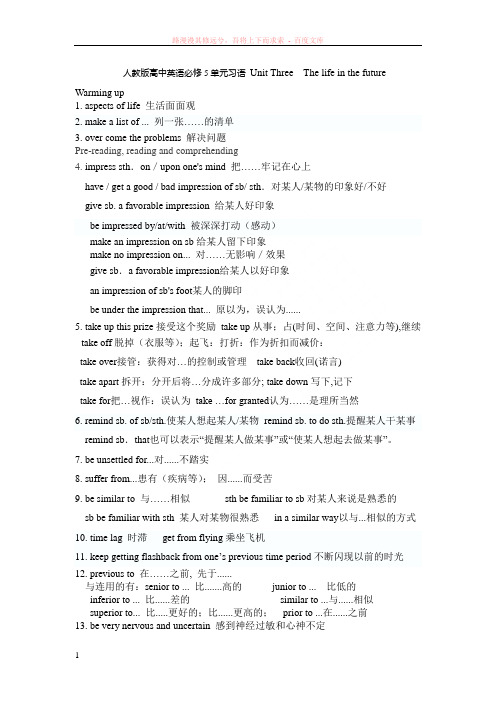
人教版高中英语必修5单元习语Unit Three The life in the future Warming up1. aspects of life 生活面面观2. make a list of ... 列一张……的清单3. over come the problems 解决问题Pre-reading, reading and comprehending4. impress sth.on/upon one's mind 把……牢记在心上have / get a good / bad impression of sb/ sth.对某人/某物的印象好/不好give sb. a favorable impression 给某人好印象be impressed by/at/with 被深深打动(感动)make an impression on sb给某人留下印象make no impression on... 对……无影响/效果give sb.a favorable impression给某人以好印象an impression of sb's foot某人的脚印be under the impression that... 原以为,误认为......5. take up this prize接受这个奖励take up从事;占(时间、空间、注意力等),继续take off脱掉(衣服等);起飞:打折:作为折扣而减价:take over接管:获得对…的控制或管理take back收回(诺言)take apart拆开:分开后将…分成许多部分; take down写下,记下take for把…视作:误认为take …for granted认为……是理所当然6. remind sb. of sb/sth.使某人想起某人/某物remind sb. to do sth.提醒某人干某事remind sb.that也可以表示“提醒某人做某事”或“使某人想起去做某事”。
人教版高中英语必修5_unit_1_单词讲解

10. expose vt. 暴露,揭露, 使曝光 expose crime揭露罪行 expose the truth揭露真相 • expose sth./sb./oneself (to...) 暴露某事物/某 人/自己(给……) expose sb/sth 揭发某人/某事 be exposed to 暴露 expose…to…“把……暴露于……之下(之中), 使……受到……作用” expose a child to books exposed adj. 暴露的,暴露于风雨中的,无掩蔽的 exposure n. [u]暴露;揭露,揭发 expose one’s skin to the sun 使皮肤暴露于阳光下
• take part in 指参加会议或群众性活动等, 着重说明句子主语参加该项活动并在活动中 发挥积极作用。 • We'll take part in social practice during the summer vacation. 暑假期间我们将参加社 会实践。 • take part in是惯用词组,part前一般不用冠 词,但part前有形容词修饰时,要用不定冠 词。Lincoln took an active part in polities and was strongly against slavery. 林肯积极 参加政治活动,强烈反对奴隶制。
vt. 治愈;治疗
curable adj. 可治愈的 a cure for... 针对……的治疗 cure sb. of sth. 改正某人的坏习惯;治愈某人的疾病
• 区别cure/treat/heal (1)treat指通过药物、特别的食品或运动治病,强 调治疗过程,不一定治好。
• treat sb. for sth.医治某人的病;还可作“对 待,看待”讲,treat...as把……看作/视为。 (2)cure意为“治愈,痊愈”,特别指病后的恢
人教版英语必修五

人教版英语必修五第一部分:课程概述人教版英语必修五是一本面向高中生的英语教材,旨在帮助学生提高英语听、说、读、写能力,为未来的学习和生活打下坚实的基础。
本教材内容丰富,结构合理,涵盖了语言知识、语言技能、情感态度、学习策略和文化意识等多个方面。
第二部分:教学目标通过学习人教版英语必修五,学生将能够:1. 掌握一定数量的词汇和短语,能够理解和使用常见的语法结构。
2. 能够听懂简单的英语对话和短文,并能进行简单的英语交流。
3. 能够阅读和理解简单的英语文章,并能用英语进行简单的写作。
4. 能够了解一些英语国家的文化背景,培养跨文化交际能力。
第三部分:教学内容人教版英语必修五的教学内容主要包括:1. 词汇和短语:学习一定数量的词汇和短语,掌握它们的用法和搭配。
2. 语法:学习一些常见的语法结构,如时态、语态、从句等,并能够正确使用。
3. 听力:通过听英语对话和短文,提高学生的听力理解能力。
4. 口语:通过角色扮演、小组讨论等活动,提高学生的口语表达能力。
5. 阅读:阅读简单的英语文章,提高学生的阅读理解能力。
6. 写作:进行简单的英语写作练习,提高学生的写作能力。
第四部分:教学方法人教版英语必修五采用多种教学方法,以提高学生的学习兴趣和效果。
这些方法包括:1. 情境教学:通过创设真实的语言环境,让学生在情境中学习英语。
2. 任务型教学:通过完成任务的方式,让学生在实践中学习英语。
3. 合作学习:通过小组合作的方式,让学生在互动中学习英语。
4. 多媒体教学:利用多媒体技术,如音频、视频等,丰富教学内容,提高学生的学习兴趣。
第五部分:评价方式人教版英语必修五的评价方式包括:1. 形成性评价:通过课堂表现、作业、测试等方式,及时了解学生的学习情况,并进行针对性的指导。
2. 终结性评价:通过期末考试等方式,全面评价学生的学习成果。
人教版英语必修五Unit 5(Warming up and Reading)课件(共39张PPT)
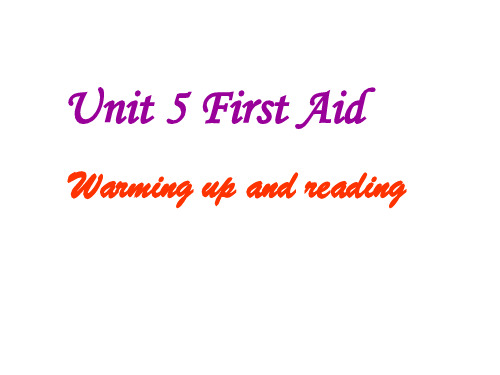
Part 1. The functions of the skin
First
aid
for burns
Part 2. Causes of burns
first degree
Part 3. Types of burns
second degree third degree
Part 4: Characteristics of burns
Because bacteria from the clothes and jewellery could infect the burns.
4. If someone has a third degree burn, why might you see tissue?
Because all layers of the skin have been burnt showing the tissue underneath.
Read Part 1 and find out The functions of skin:
1)Protect you against diseases , poisons and the sun’s harmful rays ;
2) Keep you warm or cool ; 3) Prevent you from losing too much water;
any blisters and the wound may get infected.
3.Don’t put cold water on __th__ir_d__ degree burns
4.Never put _b__u_tt_e_r,_o_i_l_or _o_i_n_tm__e_n_t on burns
人教版高中英语必修五Unit5 First aid 课文全解
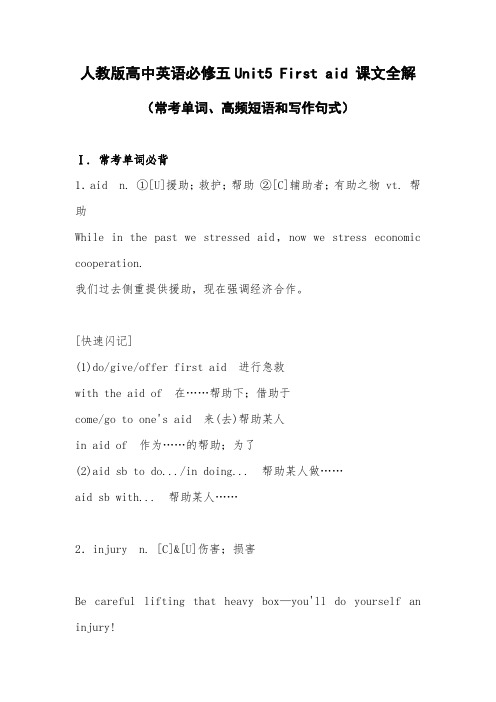
人教版高中英语必修五Unit5 First aid 课文全解(常考单词、高频短语和写作句式)Ⅰ. 常考单词必背1.aid n. ①[U]援助;救护;帮助②[C]辅助者;有助之物 vt. 帮助While in the past we stressed aid,now we stress economic cooperation.我们过去侧重提供援助,现在强调经济合作。
[快速闪记](1)do/give/offer first aid 进行急救with the aid of 在……帮助下;借助于come/go to one's aid 来(去)帮助某人in aid of 作为……的帮助;为了(2)aid sb to do.../in doing... 帮助某人做……aid sb with... 帮助某人……2.injury n. [C]&[U]伤害;损害Be careful lifting that heavy box—you'll do yourself an injury!=Be careful lifting that heavy box—you'll do an injury to yourself!抬那个重箱子要小心——你会把自己弄伤的![快速闪记]injure vt. 损害;伤害injured adj.受伤的;受冤屈的the injured 伤员do sb an injury/do an injury to sb 伤害某人3.bleed (bled,bled) vi. 出血;流血;悲痛;流出 vt.使出血;给……放血Our hearts bled for you. 我们为你感到悲痛。
bleed away one's life(=bleed to death) 流血致死Doctors sometimes bleed sick people. 大夫有时为病人抽血。
人教版高中英语必修五重点单词短语
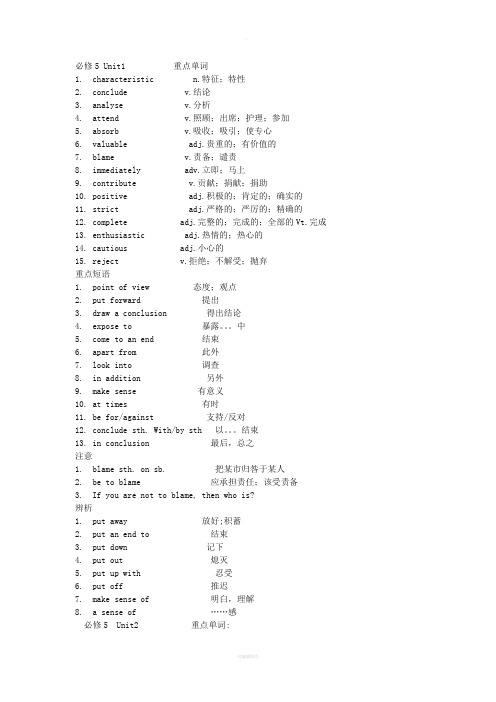
必修5 Unit1 重点单词1. characteristic n.特征;特性2. conclude v.结论3. analyse v.分析4. attend v.照顾;出席;护理;参加5. absorb v.吸收;吸引;使专心6. valuable adj.贵重的;有价值的7. blame v.责备;谴责8. immediately adv.立即;马上9. contribute v.贡献;捐献;捐助10. positive adj.积极的;肯定的;确实的11. strict adj.严格的;严厉的;精确的12. complete adj.完整的;完成的;全部的Vt.完成13. enthusiastic adj.热情的;热心的14. cautious adj.小心的15. reject v.拒绝;不解受;抛弃重点短语1. point of view 态度;观点2. put forward 提出3. draw a conclusion 得出结论4. expose to 暴露。
中5. come to an end 结束6. apart from 此外7. look into 调查8. in addition 另外9. make sense 有意义10. at times 有时11. be for/against 支持/反对12. conclude sth. With/by sth 以。
结束13. in conclusion 最后,总之注意1. blame sth. on sb. 把某市归咎于某人2. be to blame 应承担责任;该受责备3. If you are not to blame, then who is?辨析1. put away 放好;积蓄2. put an end to 结束3. put down 记下4. put out 熄灭5. put up with 忍受6. put off 推迟7. make sense of 明白,理解8. a sense of ……感必修5 Unit2 重点单词:1. unite vi.&vt. 联合;团结2. consist vi 组成;一致3. divide vt 分配;分开4. puzzle n 难题;谜 v. 使迷惑5. clarify vt. 澄清;阐明6. relation n.关系;联系7. legal adj.发律的;合法的8. convenience n. 便利;方便9. attraction n. 吸引力;吸引;吸引人的事物10. collection n. 收藏品;珍藏;收集11. construct vt. 建造;构造;创立12. influence vt. 影响;改变 n.影响;势力;有影响力的人13. project n. 课题;计划;工程14. arrange vt. 筹备;安排;整理15. wedding n 婚礼16. fold vt 对折;折叠17. sightseeing n 观光;游览18. available adj 可利用的;可用到的;有用的19. delight n 快乐;高兴;喜悦 vt 使高兴20. uniform n 制服21. spending adj 壮丽的;辉煌的22. statue n 塑像;雕像23. thrill adj 使激动24. unfair adj 不公平的;违反规则的25. smart adj 漂亮的;聪明的26. suggestion n 建议;意见重点短语1. consist of 由……组成2. to one’s surprise 令某人吃惊的是3. break away from 脱离;脱掉4. leave out 省去;遗漏5. make a list of 把……列出清单6. in memory of 为纪念……7. feel proud of 对……感到骄傲8. divide into 把……分成9. refer to 说到10. on special occasions 在特殊的场合11. take the place of 代替12. break down 损坏必修5 Unit3 重点单词:1. vehicle n.交通工具;车辆2. carriage n.四轮马车;客车3. mud n.泥;泥浆4. bathroom n.浴室;盥洗室5. temple n.庙宇;寺院6. private adj.私人的;私有的7 .location n.位置;场所8. settlement n.定居;解决9. impression n.印象;感想;印记10. constant adj.时常发生的;连续不断的11. constantly adv.不断地12. remind v.提醒;使想起13. jet n.喷气式飞机14. previous adj.在前的;早先的15. tablet n.药片16. capsule n.太空舱;胶囊17. Opening n.(出入的)通路;开口;开端18.surrounding n.周围的事物;环境 adj. 周围的ck v.缺乏;没有 n.缺乏;短缺的东西20.ache v & n.痛;疼痛21.mask n.面具;面罩;伪装22. Bend v.(使)弯曲23.press v.按;压;逼迫 n.按;压;印刷;新闻24. swift adj.迅速的;快的;敏捷的25. swiftly adv.迅速地;敏捷地26. master v.掌握;精通;征服;控制 n.主人;师傅;能手27. sight n.视力;视觉;见28. Flash v.(使)闪光;(使)闪现29. switch v.转换 n.开关;转换30. optimistic adj.乐观的;乐观主义的31. pessimistic adj.悲观的;厌世的32. opportunity n.机会;时机33. length n.长度;长34.alien adj.陌生的;外国的;外星的 n.外国人;外星人35. enormous adj.巨大的;庞大的36. imitate v.模仿;仿造37. extraordinary adj.特别的;非凡的38. extraordinarily adv.格外地;特别地39. helmet n.头盔;钢盔40. assist v.援助;帮助;协助41. agency n.代理;中介;代理处42. skip v.跳;蹦43. require v.需要;要求;命令44. cocoa n.可可豆;可可粉;可可饮料45. lemonade n.柠檬水46. herb n.药草;香草重点词组:1.take up 拿起;接受;开始;继续2.in all directions 向四面八方3. lose sight of 不再看见......4. remind of 使……回想起或意识到……5. in no time 立刻,立即6. sweep up 打扫;横扫7. assist in 帮助;援助;协助8. depend on 依靠,依赖9. catch sight of 瞥见……10. speed up 加速11. A lack of ……的缺乏必修5 Unit4 重点单词1. occupation n.职业;占有2. profession n.职业;专业3. photograph n.照片; vt.给……照相4. eager adj.渴望的;热切的5. concentrate vt.集中;聚集6. course n.过程;进程;课程;一道菜7. acquire vt.获得;取得;学到8. meanwhile adv.其间;同时9. trade n.行业;贸易;商业10. case n.情况;病例;案例11. accuse vt.指责;谴责;控告12. deliberately adv.故意地13. guilty adj.犯罪的;有罪的;内疚的14. technical adj.技术(上)的;技巧方面的15. thorough adj.彻底的;详尽的16. gifted adj.有天赋的17. defend vt.防护;辩护;护卫18. crime n.罪行;犯罪19. normal adj.正常的;正规的;标准的20. seldom adv.很少;从不21. edition n.版本;版;版次22. accurate adj.精确的;正确的23. employ vt.雇用;使用24. polish vt.擦亮;磨光;润色25. note vt.特别提到;注意;记下26. chief adj.主要的;首席的 n.首领;长官27. approve vt.赞成;称许;批准28. process n.过程;程序;步骤29. intention n.意图;目的;打算30. appointment n.约会;任命31. senior adj.年长的;高年级的;高级的重点短语1. on one’s own 独自;独立2. be eager to do sth 渴望于……3. concentrate on 全神贯注于4. accuse…of 因……指责或控告……5. go on a story 去采访6. cover a story 采访/报道7. make sure 确定;查明;弄明白;确保8. ahead of time 提前9. have a good “nose” for sth 探查发现某事物的能力24. be supposed to 应当;认为必须25. defend against 防卫以免于必修5 Unit5 重点单词1. aid n.&vt.帮助;援助;资助2. injury n.损伤;伤害3. bleed vi.&vt.(bled, bled)流血4. choke vi.&vt.(使)噎住;(使)窒息5. blood n.血;血液;血统6. burn vi.&vt.(被)烧毁烧伤;(被)烫伤n.烧伤或灼伤(的痕迹)7. organ n.器官8. poison n.毒药;毒害 vt.毒害;使中毒9. treatment n.治疗;处理;对待10. radiation n.辐射;射线11. mild adj.轻微的;温和的;温柔的12. iron n.烙铁;熨斗;铁 vt.烫熨13. electric adj.电的;电动的14. swell vi.&vt.(swelled, swollen)(使)膨胀;隆起15. swollen adj.肿胀的16. damage vt.&n.损害;毁坏17. squeeze vt.&vi. 榨;挤;压榨18. wound n.创伤;伤19. symptom n.症状;征兆20. damp adj.潮湿的21. throat n.咽喉;喉咙22. present vt.给;介绍;赠送;呈现23. ceremony n.典礼;仪式;礼节24. bravery n.勇敢;勇气25. pressure n. 压力;压;按;压迫26. authentic adj.真实的;真正的;可信的重点短语1. first aid 急救2. get injured/burnt 受伤; 烧伤3. protect…against sth 防止; 遭受4. depend on 依靠; 取决于; 依…而定5. squeeze out 榨出6. over and over again 重复7. in place 在适当的位置8. fall ill 生病9. sense of touch 触觉10. put one’s hands on 找到11. dress the injuries 包扎伤口12. make a difference 有作用必修5 Unit1重点单词1. characteristic n.特征;特性2. conclude v.结论3. analyse v.分析4. attend v.照顾;出席;护理;参加5. absorb v.吸收;吸引;使专心6. valuable adj.贵重的;有价值的7. blame v.责备;谴责8. immediately adv.立即;马上9. contribute v.贡献;捐献;捐助10. positive adj.积极的;肯定的;确实的11. strict adj.严格的;严厉的;精确的12. complete adj.完整的;完成的;全部的Vt.完成13. enthusiastic adj.热情的;热心的14. cautious adj.小心的15. reject v.拒绝;不解受;抛弃重点短语1. point of view 态度;观点2. put forward 提出3. draw a conclusion 得出结论4. expose to 暴露。
新课标人教版高中英语Book5必修五U1 Great Scientist 重点词汇、短语句型
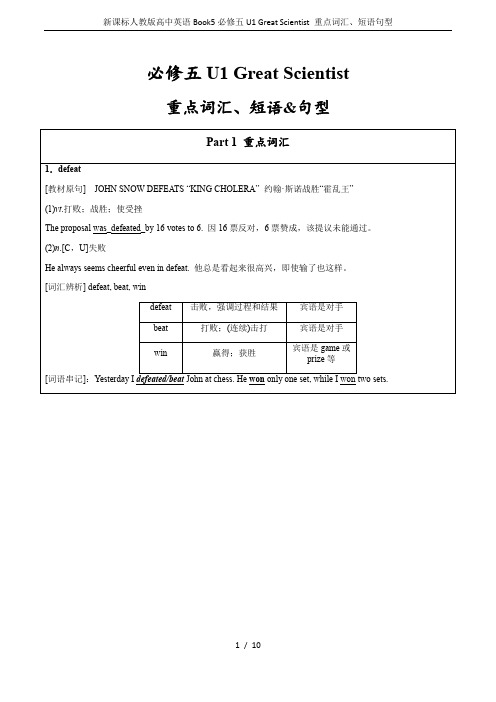
必修五U1 Great Scientist 重点词汇、短语&句型形象记忆[动]construct建造↔[动]destroy破坏[名]construction建造↔[名]destruction破坏形象记忆Many people contributed money to the poor boy, which contributed to his returning to school. A writer wrote a story about this and contributed it to a newspaper.许多人给那个可怜的男孩捐款,使他可以重返校园。
一位作家写了一则关于此事的故事并把它投到一家报社。
形象记忆5. He placed a fixed sun at the centre of the solar system with_the_planets_going_round_it and only the moon still going round the earth.他把固定的太阳放在太阳系的中心,别的行星都围绕太阳转动,只有月亮仍然围绕地球转动。
with the planets going round it 是“with +宾语+宾语补足语”结构,在句中作状语,表示原因、条件、伴随等。
此外,此结构还可作后置定语。
with 复合结构的构成:with +宾语+⎩⎪⎨⎪⎧ adj ./adv ./介词短语宾语和宾补之间是主动关系宾语和宾补之间是被动关系不定式作宾补有“将来”的含义①The little boy ran along the street with nothing on. 这个小男孩沿街跑着,什么也没穿。
②With prices going_up,_we can't afford too many clothes. 随着物价的上涨,我们买不起太多的衣服。
人教版高中英语必修五词汇表(含教材例句及词汇用法讲解)
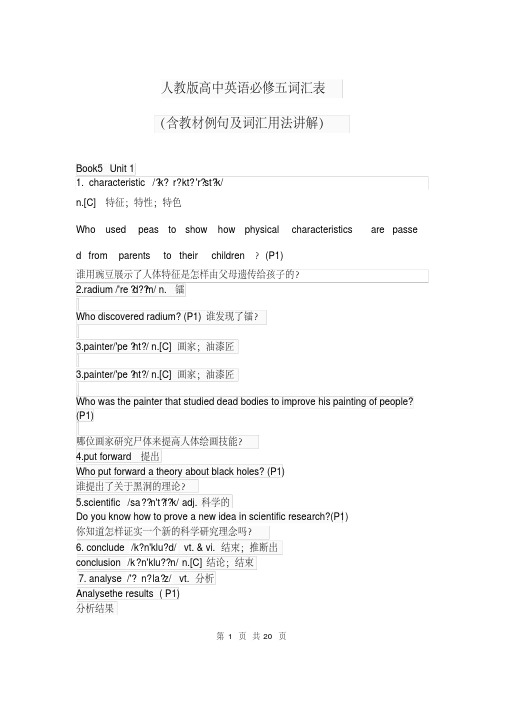
人教版高中英语必修五词汇表(含教材例句及词汇用法讲解)Book5 Unit 11. characteristic /?k?r?kt?'r?st?k/n.[C] 特征;特性;特色Who used peas to show how physical characteristics are passed from parents to their children?(P1)谁用豌豆展示了人体特征是怎样由父母遗传给孩子的?2.radium /'re?d??m/ n. 镭Who discovered radium? (P1) 谁发现了镭?3.painter/'pe?nt?/ n.[C] 画家;油漆匠3.painter/'pe?nt?/ n.[C] 画家;油漆匠Who was the painter that studied dead bodies to improve his painting of people? (P1)哪位画家研究尸体来提高人体绘画技能?4.put forward 提出Who put forward a theory about black holes? (P1)谁提出了关于黑洞的理论?5.scientific /sa??n't?f?k/ adj. 科学的Do you know how to prove a new idea in scientific research?(P1)你知道怎样证实一个新的科学研究理念吗?6. conclude /k?n'klu?d/vt. & vi. 结束;推断出conclusion /k?n'klu??n/ n.[C] 结论;结束7. analyse /'?n?la?z/ vt. 分析Analysethe results ( P1)分析结果第 1 页共 20 页8. △infect /?n'fekt/ vt. 传染;感染△infectious /?n'fek??s/ adj. 传染的What do you know about infectious diseases? (P1)你对传染病了解些什么?9.△cholera /?k?l?r?/n. 霍乱What do you know about cholera? (P1)你对霍乱了解些什么?10. defeat /d?'fi?t/ vt. 打败;战胜;使受挫JOHN SNOW DEFEAT “KINGCHOLERA”(P2)约翰·斯诺战胜“霍乱王”11.expert /'eksp??t/ a dj. 熟练的;经验或知识丰富的(反义词inexpert)John was a famous doctor in London—so expert, indeed, that he attended Queen Victoria as her personal physician. (P2)约翰·斯诺是伦敦一位著名的医生—他的确医术精湛,因而成为照顾维多利亚女王的私人医生。
人教版高中英语必修五全册--核心词汇短语归纳 unit 4
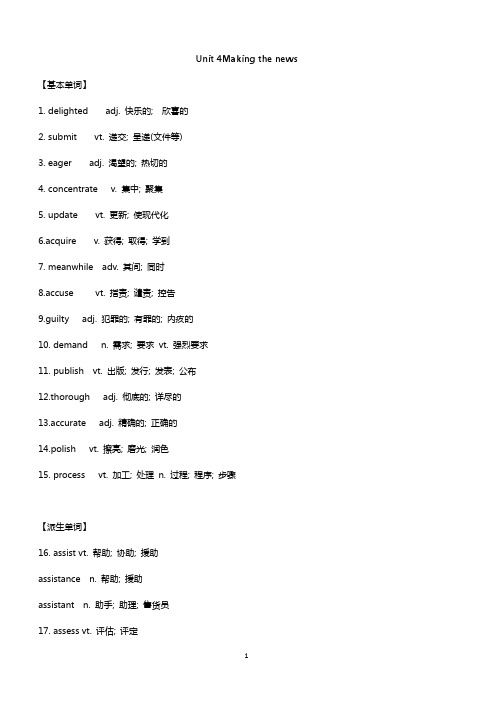
Unit 4Making the news 【基本单词】1. delighted adj. 快乐的; 欣喜的2. submit vt. 递交; 呈递(文件等)3. eager adj. 渴望的; 热切的4. concentrate v. 集中; 聚集5. update vt. 更新; 使现代化6.acquire v. 获得; 取得; 学到7. meanwhile adv. 其间; 同时8.accuse vt. 指责; 谴责; 控告9.guilty adj. 犯罪的; 有罪的; 内疚的10. demand n. 需求; 要求vt. 强烈要求11. publish vt. 出版; 发行; 发表; 公布12.thorough adj. 彻底的; 详尽的13.accurate adj. 精确的; 正确的14.polish vt. 擦亮; 磨光; 润色15. process vt. 加工; 处理n. 过程; 程序; 步骤【派生单词】16. assist vt. 帮助; 协助; 援助assistance n. 帮助; 援助assistant n. 助手; 助理; 售货员17. assess vt. 评估; 评定Assessment n. 评定; 评价18. inform vt. 告知; 通知information n. 信息; 消息19.senior adj. 年长的; 高年级的; 高级的(反义词)junior adj. 青年的; 低下的20. approve vt. 赞成; 认可; 批准approval n. 批准; 认可【短语】1. 集中; 全神贯注于concentrate on2. 依靠; 依赖depend on3. 因……指责或控告……accuse …of4. 为了(做)……so as to (do sth.)5. 在……前面ahead of6. 对……有敏感的嗅觉have a good nose for7. 通知某人某事inform sb. of sth.8. 记在心里keep in mind9. 完全误解; 弄错get the wrong end of the stick10. 最后last of all【句式】1. Never will Zhou Yang (ZY) forget his first assignment at the office of a popular English newspaper. 周阳永远不会忘记他在一家畅销英文报纸的第一项工作任务。
(完整版)人教版高中英语必修五Unit1知识点详解

必修5 Unit1 Great scientistsPart 1. Warming up1.explain及物动词(vt.)解释;说明;阐明[(+to)][+wh-][+(that)]He explained that he had been cheated. 他解释说他是上当受骗了。
Can you explain how the machine operates?你能解释一下这机器是如何运转的吗?Please explain this rule to me.请给我讲解一下这条规则。
不及物动词(vi.)解释;说明;辩解I've got to explain about it. 我得解释一下此事。
2.characteristicn. 特征;特性Kindness is one of his characteristics.adj. 独特的I heard my friend’s characteristic laugh.be characteristic of sb./sth. 是.....的特性Such bluntness is characteristic of hin. 如此迟钝是他的特性。
3. Who put forward a theory about black holes?put forward 提出(建议等);提名;提前,把时钟往前拨He put forward a new plan. 他提出一个新计划。
May I put your name forward as a possible chairman of the committee?我能否提名你当委员会主席?[归纳拓展]put down 记下;镇压put out 关掉;熄灭put aside 放在一边;储存;保留put off 推迟;延期put up 建造;举起;张贴put on 穿上put away 收好选词填空(put off, put up, put forward, put aside, put out)①The plan that you _____ at the meeting is wonderful.②Many tall buildings were _____ along the road.③Firefighters have been called to _____ the fire in the city center.④He has a little money to _____ for a rainy day.⑤Don’t _____ until tomorrow what can be done today.Part 2. Pre-reading, reading and comprehending1. Do you know how to prove a new idea in scientific researchhow to prove a new idea 为“疑问词+不定式”结构,该结构可在句中作主语、宾语、表语等。
人教版高中英语必修五全套教案
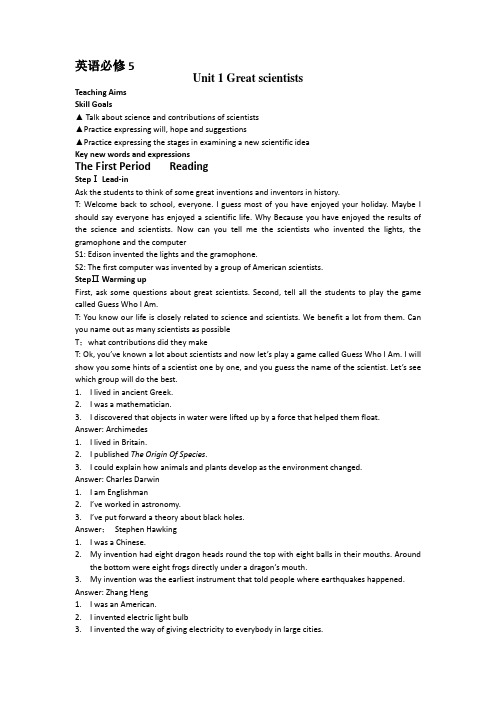
英语必修5Unit 1 Great scientistsTeaching AimsSkill Goals▲ Talk about science and contributions of scientists▲Practice expressing will, hope and suggestions▲Practice expressing the stages in examining a new scientific ideaKey new words and expressionsThe First Period ReadingStepⅠ Lead-inAsk the students to think of some great inventions and inventors in history.T: Welcome back to school, everyone. I guess most of you have enjoyed your holiday. Maybe I should say everyone has enjoyed a scientific life. Why Because you have enjoyed the results of the science and scientists. Now can you tell me the scientists who invented the lights, the gramophone and the computerS1: Edison invented the lights and the gramophone.S2: The first computer was invented by a group of American scientists.StepⅡ Warming upFirst, ask some questions about great scientists. Second, tell all the students to play the game called Guess Who I Am.T: You know our life is closely related to science and scientists. We benefit a lot from them. Can you name out as many scientists as possibleT;what contributions did they makeT: Ok, you’ve known a lot about scientists and now let’s play a game called Guess Who I Am. I will show you some hints of a scientist one by one, and you guess the name of the scientist. Let’s see which group will do the best.1.I lived in ancient Greek.2.I was a mathematician.3.I discovered that objects in water were lifted up by a force that helped them float. Answer: Archimedes1.I lived in Britain.2.I published The Origin Of Species.3.I could explain how animals and plants develop as the environment changed.Answer: Charles Darwin1.I am Englishman2.I’ve worked in astronomy.3.I’ve put forward a theory about black holes.Answer;Stephen Hawking1.I was a Chinese.2.My invention had eight dragon heads round the top with eight balls in their mouths. Aroundthe bottom were eight frogs directly under a dragon’s mouth.3.My invention was the earliest instrument that told people where earthquakes happened. Answer: Zhang Heng1.I was an American.2.I invented electric light bulb3.I invented the way of giving electricity to everybody in large cities.Answer: Thomas Edison1.I was a lady and born in Poland.2.I received two Nobel prizes.3.I discovered radium.Answer : Marie CurieStep Ⅲ Pre-readingGet the students to discuss the questions on page 1 with their partners. Then ask the students to report their work. Encourage the students to express their different opinions.T: Now, class, please look at the slide. Discuss these questions with your partner s. Then I’ll ask some students to report their work.Show the following on the screen:1. What do you know about infectious diseases2. What do you know about cholera3. Do you know how to prove a new idea in scientific researchT: Well done! When we want to solve some problems, first we should find out the problem, do some research on it, prove your findings, and then make a conclusion. This is a scientific and objective way of researching. Now let’s see how doctor John Snow did his research.Step Ⅳ ReadingT: Now lets read the title and the picture and guess what the passage may tell us.T: The effect of cholera in the nineteenth century London was devastating. Many people died without knowing the reason. It was doctor John Snow who saved the people. Please look at the screen. Let’s read the whole passage quickly and find the number below and the relevantStep Ⅴ Text analyzingAsk the students to analyze the text in groups.T: Please look at the chart on the screen. The chart shows that each paragraph of the text explains John Snow’s stages in his research. Please read the text and find out the general idea of each paragraph and match the stage with each paragraph. Discuss it in groups, and then report your answers.T: Now class. Can you tell me what style of the passage belongs toT: Here are three pieces of writing. They belong to different writing styles. Now read and find out what style each piece belongs to.Step Ⅲ ReadingEncourage the students to get the general ideas of the passages.T: In the last period, we have learned about how Doctor John Snow used seven stages to prove his conclusion and fulfilled his research. This period we will also deal with a scientific report. Please read the passage quickly and try to answer the questions on the screen.Show the questions on the screen.1. What’s Copernicus’ fear2. How did Copernicus prove his theory3. What is his theoryStep Ⅳ Further-readingThis time the students are encouraged to read the two passages carefully and then do the exercises and problems on pages 7.T: Now class. Please read the passage again. And finish EX 1 and then discuss the questions on the screen in groups.As a scientist, one should be brave. But Copernicus was afraid of being attacked by the Christian Church. So he had hidden his theory for so many years. What do you think of thisSample answers:Q1: think Copernicus was very coward. He should speak out his discovery and let the world know the truth earlier.don’t agree with you. He was more cautious than coward. If he had published his ideas, he would have been killed just as Bruno who was burnt to death because his theory was against the Christian Church’s.T: I quite agree with you. And I am glad you have known so much about the science.StepⅤ Language PointsAnd then write the following sentences on the blackboard; ask the students to pay attention to the past participle. Guide them to find out their functions in the sentences.Show the following on the screen.1. Nicolas Copernicus was frightened and his mind was confused.2. He placed a fixed sun at the center of the solar system ...3. He joined these points together using curved lines ...T: Please read the three sentences and tell me what parts of speech the past participles are acting as.Step Ⅵ Homework1. Search on the Internet for more information about Copernicus and Euler.2. Prepare for the language study, reviewing the words and expressions in this unit.The Third Period Language StudyStepⅠRevision and Lead-inTask 1: Ask the students to turn to pages 4 and 42 and do Exercise 1. And then check the answers.Task 2: Ask the students to read and understand the explanations in Exercise 2 on page 4.T: Very good! Can you put the verb “make” with a noun to form a “predicate + object” phrase For example: “making a mistake” instead of “to mistake”.Sample answers:S: “make an agreement”, “make an admission”, “make an apology”.T: Well done! Please find and collect as many examples as you can as homework. Next period I’ll check your work.Task 4: Ask the students to do Exercises 3 on page 43 and then check the answers.Step Ⅱ PracticeTask 1: Enable the students to do the following exercises.T: Please look at the screen and put them into English using “make + n” and past participles. Show the following on the screen:Step Ⅲ GrammarExplain the usage of the past participles as predicative and attribute.Unit 2 The United KingdomⅠ. Teaching AimsSkill Goals▲ Talk about the United Kingdom▲ Talk about language difficulties in communicationⅡ. Language GoalsThe past participle as the object complement ... the three countries found themselves unitedpeacefully ...However, just as they were going to get Ireland connected to form ...You find most of the population settled in the South, ... .1. Now when people refer to England you find Wales included as well. P92. However, the southern part of Ireland was unwilling and broke away to form its own government. P103. The greatest historical treasure of all is London with its museums, art collections, theatres, parks and buildings. P104. You must keep your eyes open if you are going to make your trip to the United Kingdom enjoyable and worthwhile! P105. Her first delight was going to the Tower.P146. There followed S t Paul’s Cathedral built after the terrible fire of London in 1666. P147. That is why, even today, when people can follow any religion they like, families still have firework parties and burn cloth dolls of Guy Fawkes on a bonfire. P52The First Period ReadingTeaching goals1. Target languagea. Key words and expressionsunite, kingdom, consist, divide, puzzle, clarify, relation, legal, convenience, attraction, collection, construct, influence, consist of, divide ... into, break away (from), leave outb. Key sentences1. Now when people refer to England you find Wales included as well. P102. However, the southern part of Ireland was unwilling and broke away to form its own government. P103. You must keep your eyes open if you are going to make your trip to the United Kingdom worthwhile! P102. Ability goalsEnable the students to learn about the United Kingdom (the UK).3. Learning ability goalsEnable the students to know the UK in geography and history.Teaching important & difficult pointsHow to understand the geographic puzzle of the UK.Teaching methodsSkimming and task-based activities.Teaching aidsA recorder, a computer and a projector.Teaching procedures & waysStep ⅠLead-inTask 1: Free talk about the topic: The United Kingdom.Reference topic:1. Have you ever been to the UK If you have, can you tell us something about it or can you tell us something about your visit(s) there Or what is your impression of the UK If you haven’t, where can you get the information about it2. What is the capital of the UK And what is the languageStep II Pre-readingStep III While-readingTask 1: Ask the students to describe briefly the UK according to the following map.A sample description:1. Look through the passage as fast as possible;2. Try to find the answers to the questions given in the Comprehending.Sample answers:S1: Wales, for we can’t find any pattern of flag of Wales and it is usually assumed to be part of England.S2: It represents England, Scotland and Northern Ireland.S3: The Vikings. They only influenced the vocabulary and the place names of the North.Task 4: SkimmingT: Please skim the passage to get the general idea of the whole passage. While reading, please try to divide the whole passage into proper parts and find out the main idea of each part (helping the students fulfill the task if necessary).Sample answers:Part 1 (Para. 1-2): What England includes; about Great Britain; the UK.Part 2 (Paras. 3-4): The geographic division of England into zones, their similarities and differences.Part 3 (Para. 5-6) : The cultural importance of London.T: Then how do you understand the title of the text Puzzles in Geography Are there really any puzzles in geography of the UK If so, what are they If not, why does the writer use “Puzzle s in Geography” as the title Get the students to discuss about it in pairs.Then ask the students to fill in the following form.T: Now let’s do “Comprehending” Exercise 3. Look at the map of England and Wales. Divide it into three parts. Draw lines across the zones of the South, Midlands and the North of England. Put each town or city into its correct zone.Sample answers:North: York, Leeds, Sheffield, ManchesterMidlands: Coventry, BirminghamSouth: Reading, London, Brighton, PlymouthTask 4: Ask the students to analyze the text.2. Ask some of the students to retell the text.A sample version:When people speak of the UK, England, Wales, Scotland and Northern Ireland are often used. England and Wales were linked together first, which happened in the 13th century AD. Then James, Scotland King, united the three countries to form Great Britain in 1603 peacefully. Later on, the three countries intended to get Ireland connected to found the UK. However, the southern part broke away and formed its own government. So only Northern Ireland became part of the UK. The four countries, of which England is the largest, work together as a whole but they have developed different educational and legal systems.The Second Period ListeningTeaching goals1. Target languageKey words and Expressionscrown, Protestant, hurt the king2. Ability goalsEnable the students to learn about one of the most famous historical sites in London: the Tower of London.3. Learning ability goalsHelp the students learn how to talk about the historical sites in the UK.Teaching important & difficult pointsTalk about the historical sites in the UK.Teaching methodsListening and cooperative learning.Teaching aidsA recorder, a computer and a projector.Teaching procedures & waysStep Ⅰ Revision and Lead-inCheck the students’ homework.Then ask the students to read as fast as possible the instructions and then listen to the tape twice to get the best answers.T: The Monarchy is the oldest institution of government in the United Kingdom. Until 1603 the English and Scottish Crowns were separate; after this date one monarch reigned in the United Kingdom. Now please open your books and turn to page 15. Let’s take up “Listening”. Before you listen to the tape, please read fast the instructions and find out the key points for listening. Pay much attention to the following important points while listening.1. Which king on the list was one of the princes in the Tower How do you know2. Who had the two princes killedAnd then check the answers.Step Ⅱ Listening (P52-53)T: Now we shall take up the “Listening task” on page 52. and do Exercises 1, 2 and 3. Read the instructions first and then do the exercises.Check the answers with the students.Step Ⅲ HomeworkT: Boys and girls, today we have listened to some materials. I do hope you can listen to the materials again after class. And from this unit we have learned a lot about the United Kingdom, its past history, some popular tourist sites, the Tower of London as well as some of the criteria of the British citizens. After class please find some information about London.The Third Period Extensive ReadingTeaching goals1. Target Languagea. Key words and expressionssightseeing, available, delight, tower, royal, uniform, splendid, statue, communism, thrill sentencesWorried about the time available, Zhang Pingyu had ... P14But she was thrilled by ... P142. Ability goalsEnable the students to plan a tour around certain places.3. Learning ability goalsHelp the students know more about the historical sites in London.Teaching important & difficult pointsHelp the students identify different kinds of tour and talk about the most interesting place for the tour.Teaching methodsTask-based activities.Teaching aidsA computer and a projector.Teaching procedures & waysStep I Revision and Lead-inTalk about London with the students.T: London has been a capital city for nearly 1,000 years, and many of its ancient buildings still stand. Have you found any information about LondonS1: The most famous sites in London are the Tower of London, Westminster Abbey and St. Paul’s Cathedral. But most visitors also want to see the House of Parliament, Buckingham Palace, which is the Queen’s London home.S2: Once, London was a small Roman town on the north bank of the Thames, but slowly it grew into one of the world’s major cities with more than 7 million people. Different areas of London seem to be like different cities. And it also has many big parks, full of trees, flowers and grass. Sitting on the grass in the middle of Hyde Park or Kensington Gardens, you are in the country, miles away.S3: Many people think that London is all gray, but in fact red is London’s favor ite color. London is at its best when people are celebrating. Then the flags, the cheering crowds and the carriages and horses all sparkle in the sunshine —if it’s not raining, of course! However, it is often foggy. That’s why it’s called “fog city”.Ask the students to read the passage and do the exercises after the passage.T: “Sightseeing in London” is about a Chinese girl’s first visit to London. It tells us how it would feel to visit London for the first time. Now read and find the answers to the questions after the text.Step Ⅱ ReadingTask 1: Ask the students to read the text to get the main idea.T: Now please read the text and find the answers to the following questions.Show the questions on the screen.1. How did Zhang Pingyu plan her tour2. What were the buildings mentioned in the text What were they famous for Who built them What happened to themSample answers:1. First, she made a list of the sites she wanted to see. Then she planed her four-day trip.2. The buildings mentioned in the text were:Tower, built by Norman invaders of AD 1066, it is a solid, stone, square tower which remained standing for one thousand years; St Paul’s Cathedral, built after the terrible fire of London in 1666, looked splendid; Westminster Abbey, contains statues in memory of dead poets and writers;Greenwich, the longitude line; Big Ben; Highgate Cemetery; Windsor Castle.Task 2: Ask the students to study the structure of the text “Sightseeing in London”.Show the following.Task 3: Deal with reading task:A particular British celebrationAsk the students to read the passage quickly for the first time to find out the main idea of the text. Then ask them to read the text again carefully to obtain some details and do the exercises after the text.T: Guy Fawkes Night is celebrated in Britain annually on November 5th. The event is accompanied by firework displays, the lighting of bonfires and the ceremonial effigy-burning of one Guy Fawkes.The originof this celebrationcomesfrom theevent which took place in 1605 and was a conspiracy known as “The Gunpowder Plot”, intended to take place on November 5th of that year (the day set for the opening of Parliament). Now read the text and then find the answers to the exercises.Sample answers to Exercise 1:Oct. 10: one of Fawkes’ Catholic friends, named Catesby, asked him if he would support a plan to change the government and replace it with another.Oct. 27: Fawkes and Catesby arranged to buy a house close to the Houses of Parliament.Oct. 28-31: Catesby and Fawkes bought large containers of gunpowder and stored them in the cellar.Nov. 6: the king and all his advisers would be in the parliament for the meeting.Sample answers to Exercise 2:S1: I would not like to be King James, because he kept changing his mind. He would say, “I could not be tolerant of their religion.” And he took actions to stop people believing in Catholic. S2: I would like to be Robert Catesby. He would say like this: The king is never so tolerant of the Catholics. So I decided that a violent action is the only answer. The thing to do was to blow up the Houses of Parliament. In doing so, we would kill the King, maybe even the Prince of Wales, and the Members of Parliament who were making life difficult for the Catholics. And to carry out the plan, Catesby and his men got hold of 36 barrels of gunpowder — and stored them in a cellar, just under the House of Lords.S3: I would be an eyewitness: As the group worked on the plot, it became clear that innocent people would be hurt or killed in the attack, including some people who even fought for more rights for Catholics. Some of the plotters started having second thoughts. One of the group members even sent an anonymous letter warning his friend, Lord Monteagle, to stay away from the Parlia-ment on November 5th.S4: I would not like to be Guy Fawkes. Because he would say, “some of us have betrayed, so we should start the plan in advance.” So he tried to start the fire. But the soldiers found him before he could do anything and he was taken to the Tower of London to be killed.S5: If King James had kept his promise, nothing would have happened.Step Ⅲ HomeworkAsk the students to review the words learnt in this unit.Unit 3 Life in the futureⅠ. Teaching AimsSkill Goals▲Talk about things in the past, at present and in the future▲Talk about changes at present▲Predict good and bad changes in the futureⅡ. Language Goals1.MemorizeExpect, aspect, constant, constantly, remind, jet, previous, tablet, capsule, opening, surrounding, lack, ache, mask, bend, press, swift, swiftly, master, sight, flash, switch, optimistic, length, extraordinary, extraordinarily2.Read upjet lag, flashback, expertise, hover, pessimistic, enormous, imitate,3.Expressionstake up, remind ... of ..., lose sight of ..., catch sight of ..., sweep up, speed up, assist in4.Key sentencesconstant, remind, lack, sight, assist, require, settlement, previous, swiftThe past participle as the attribute…and following him to collect a hovering carriage driven by computer.The past participle as the adverbialWorried about the journey, I was unsettled for the first few days.Hit by a lack of fresh air, my head ached.Exhausted, I slid into bed and fell fast asleep.1. This is similar to the “jet lag” you get w hen flying, but instead it means you keep getting flashbacks from your previous time period. P172. Well-known for their expertise, his parents’ company named “Future Tours” transported me safely into the future in a time capsule. P183. He handed it to me and immediately hurried me through to a small room nearby for a rest. P184. He was swept up into the centre of them.5. I found later that their leaves provided the house with much-needed oxygen. P188. Everyone will get twice as much personal space as in flats on land. P589. Only when the robot cleaner touches objects can they be moved. P59Ⅲ. 教材分析与教材重组Ⅳ. ProceduresThe First Period ReadingTeaching goals1.Target languagea. Key words and expressionsconstantly, remind, vehicle, carriage, bathroom, temple, private, settlement, impression, constant,jet, previous, tablet, capsule, opening, surrounding, lack, ache, mask, bend, press, swift, swiftly, master, sight, flash, switch, optimistic, length, take up, lack of, lose sight of, sweep up, catch sight ofb. Key sentencesThis is similar to ..., but it means ... P17Well-known for ..., his parents’ company,called “Future Tour”, transported me safely into the future in a time capsule.. P18He handed it to me and immediately hurried me through to a small room nearby for a rest. P18 2. Ability goalsEnable the Ss to talk about the life in the past, at present and in the future.3. Learning ability goalsHelp the Ss learn how to describe the life in the past, at present and in the future.Teaching important &difficult pointsCompare life in the past, at present and in the future.What is life in the future like What changes will take placeTeaching methodsFast and careful reading; asking and answering activity; individual, pair or group work. Teaching aidsA computer and a projector.Teaching procedures &waysStep I Warming UpStep Ⅱ Pre-readingGet the Ss to discuss the problems that human beings are facing today (such as pollution, all kinds of shortages). Make a prediction about the future: which problems may be solved, and which will still be there. This part will prepare the Ss for the text.T: We all know that as our society develops, we have got much benefit. But at the same time, we have to face lots of problems. Can you find out what kind of problems human beings are facing S: Pollution.S: Population is becoming larger and larger.S: The shortage of resources.T: Yes! Then can you predict which problems can be solved in the future And which ones will still be thereS: I think the problem of population will be solved in the future, because now more and more countries have begun to control the birth rate.S: I think the problems of pollution and shortage of resources will still be there, and will even get worse.S: I don’t think so. Now scient ists all over the world are trying their best to develop new resources that human beings can make use of, such as solar energy. In my opinion, the problems can be solved one by one.Step Ⅲ ReadingT: Now please open your books and turn to page 17. Let’s re ad the passage First Impressions. Read it quickly and then tell me what it is about.Several minutes later.T: Well, have you finished reading the passageSs: Yes.T: OK. Who would like to tell me what the text is aboutStep Ⅳ Follow-up ActivityGet the Ss to compare life at present and in the future. Find out the changes on several items. Try to distinguish which changes are good and which are not good and give reasons.T: Now let’s make a prediction about future and see what will be changed in the future. I will give you 3 minutes to discuss in pairs, and after your discussion please finish the following chart.The Second Period ListeningTeaching goals1. Target languageKey words and expressionsextraordinarily, atmosphere, gravity, assist in2. Ability goalsEnable the Ss to tell the differences between two kinds of alien creatures.Enable the Ss to understand the facilities in “Wonderworld”.3. Learning ability goalsHelp the Ss learn how to promote a new invention by analyzing different situations.Teaching important &difficult pointsListen to the material about the new invention and find out its special qualities.Teaching methods Discussion; listening; cooperative learning.Teaching aidsA computer, a projector and a recorder.Teaching procedures &waysStep Ⅰ Lead-inStep ⅡListeningUnit 4 Making the new sⅠ. Teaching aimsSkill Goals▲ Talk about the basic procedure of making a newspaper▲ Talk about the basic qualities and skills a journalist should have▲ Talk about jobs in a newspaper▲ Learn how to make an appointment▲ Learn how to use Inversion correctly▲ Write a newspaper articleⅡ. Language GoalsMaking appointmentsⅣ. ProceduresThe First Period ReadingTeaching goals1. Target languagea. Key words and expressionsoccupation, photograph, photographer, colleague, eager, concentrate, course, acquire, meanwhile, recorder, case, accuse, deliberately, guilty, concentrate on, accuse ... of, so as to (do sth), defend against,cover a story,have a “nose” for a story, get a scoop, get sth straight, a trick of the tradeb. Key senrences (P26)Never will Zhou Yang forget ...Only when you have seen ..., can you cover a story ...Only if you ask ... will you acquire ...2. Ability goalsEnable the students to talk about the qualities needed to be a good reporter and how to conducta good interview.3. Learning ability goalsStep Ⅰ Lead-inStep Ⅲ Pre-readingT: Now if you want to be a good news reporter, what qualities do you think you need to have Step Ⅴ ComprehendingThe Second Period VocabularyTeaching goals1. Target languagea. Key words and expressionstechnical, process, polish, concentrate on, approve of, by accident, get absorbed in, defend against, break downb. Key sentences (P29)She does not get absorbed in ...The reporter went out with ...2. Ability goalsEnable the students to know how to use some expressions in an idiomatic way.3. Learning ability goalsHelp the students learn how to use the words and expressions more freely.Teaching important pointsGet the students to practice the words and expressions.Teaching difficult pointsHelp the students use the words and expressions correctly.Teaching methodsTask-based learning; explaining; discussing; practicing.Teaching aidsA computer and a projector.Teaching procedures &waysStep Ⅰ RevisionT: Good morning / afternoon, class. Last period we talked about the qualities needed to be a good reporter, how to get an accurate story and how to protect a story from accusation. Now I’d like you to tell me what qualities a good reporter needs to have. Who’d like to tryS: Let me try. A good reporter needs to be thorough, curious, careful and concise, professional, well-organized and patient.T: Excellent! Then how can a good reporter get an accurate storyS: He / She should be able to ask different questions, note reactions from the people he is interviewing, check facts and do research.T: Great! How can a good reporter protect a story from accusationS: Use a small recorder during the interview to make sure of getting all the facts straight.T: Wonderful!Step Ⅱ Discovering useful words and expressionsT: In the reading there are some adjectives that come from nouns. please form them by adding -al. Look at Exercise 3 on page 28. Complete the table. Three minutes later, check the answers.Step III Summary and HomeworkT: In this perio d we’ve learned some useful words and expressions. You need to do more practice after class. Now homework for today:1. Review the words and expressions for this unit.2. Preview Discovering useful structures.。
高中英语人教版必修五Unit 5 First Aid-FirstAid for Burns教案

教学设计《普通高中课程标准实验教科书英语》必修5 Unit5 First Aid-First Aid for Burns所教年级高二年级单元Unit5 First Aid-First Aid for Burns本节课以First Aid for Burns为话题,结合学生日常生活中经常发生的小意外以及处理方法,设计了warming up部分;Reading部分主要围绕First Aid for Burns主要设计主题了解如何处理不同程度的烧伤。
1.整体设计思路本单元出自是人民教育出版社出版的高二英语新教材必修5的第五单元First Aid-First Aid fo rBurns,其中心话题围绕“First Aid”展开,reading部分是本课的重点,重在训练学生精确找到阅读信息的能力,并且从阅读中获取解决实际问题的技能,如怎样判断烧伤的不同等级以及如何处理烧伤。
本课所学到的知识有利于学生解决生活中的实际问题。
Warming-up 以学生实际生活中可能遇到的小意外的照片引入话题,激发学生兴趣;阅读部分以阅读任务推动,引导学生发展阅读能力;读后部分以小组为单位学习不同小意外的处理方法,然后进行班级分享,鼓励学生以动作、语言输出所学知识,并结合实际情况学以致用。
总结部分采用新闻视频,让学生观看一名护士利用急救知识偶然在高速公路上久了一名发生车祸的陌生人的新闻报道,引导学生形成用所学拯救他人的价值观,弘扬社会主义核心价值观。
2.教学背景分析本课的授课对象是高二的学生,已经积累了一定的英语阅读技巧,但学生不习惯用英语表达。
学生情况分析:本单元所涉及的话题对于学生来说并不陌生,但是学生平时很少关注具体情况下的急救办法,希望教材分析:通过本课的学习,教会学生如何应对可能出现的生活小意外,并提高急救意识。
3.教学目标分析1.Get familiar with some useful words , phrases and sentence patterns in this passage. Teaching aims:2. Improve the reading skills3.Know some simple skills of first aid and use what we have learned to help othersaching important and difficult points:Get students to acquire some first aid skills through readingHow to output what they learnt into practice to solve some daily problems.5.教学过程设计Teaching procedures:tep2.Lead-in(Teacher should take some photos about daily accidents of students before lass.) Look at the pictures. What happened to the students? What should we do to helphem? (Draw students' attention to the topic "First Aid")2. Task1:What is first aid?A form of help given to someone who suddenly fall ill.There are other times when giving first aid quickly can save people's lives.Step3. Reading1.Fast reading:Task2:Scan for the structure of the passagePart 1:The Introduction of the skinpart 2: the characteristics of burnsPart 3: the treatment of burns2.Detailed reading:1.:What may cause burns?2: What is the feature of second degree burns?3: Why is it necessary to remove the burns?Step 4: Summarize and homework。
人教版高中英语必修五Unit5单词详解

⼈教版⾼中英语必修五Unit5单词详解Unit 51、aid n. & vt.帮助;援助;资助with the aid of在…的帮助下,在…援助下give aid to给…予帮助first aid急救;急救护理aid in vt. 帮助;帮助(在...给予帮助)2、first aid(对伤患者的)急救3、tem·po·rar·y [ 'temp??r?ri ] adj.tempor=time时暂时的;临时的temporary storage暂时存储器;暂时库容;中间存储器temporary work临时⼯作;临时⼯程temporary shelter临时避难所;临时收容中⼼;临时安置所;临时庇护站temporary construction临时建筑⼯程;临时结构,临时构筑物temporary job临时性⼯作temporary employment短⼯temporary file暂时⽂件;暂存⽂件temporary housing临时住房,应急住宅;临时住宿temporary road临时道路temporary worker临时⼯4、fall ill⽣病5、in·ju·ry [ 'ind??ri ] n.(plural in·ju·ries)损伤;伤害brain injury [医]脑损伤personal injury⼈⾝伤害serious injury重伤;严重损害head injury头部伤害bodily injury⾝体伤害industrial injury⼯伤;⼯业损伤back injury背部损伤injury time(⾜球⽐赛中)伤停补时cold injury冻伤skin injury⽪肤损伤human injury⼈⾝事故6、bleed vi. & vt.(bled; bled)流⾎1.Then left him there bleed to death . 他们就让他慢慢流⾎⽽死。
2023年人教版高中英语必修五知识点详解

人教版高中英语必修五知识点详解Units 1-21. doubtdoubt是高考中旳高频考察词汇。
doubt可作动词和名词,是新课标重点词汇。
其命题角度为:①作动词时,若为肯定句,后跟宾语从句,一般用if/whether引导,若为否认句,则一般用that引导。
②doubt作名词时,一般用于There is no doubt that ...(毫无疑问)构造。
高考对doubt旳考察还将集中在其后跟从句时连接词旳选择上,也有也许将doubt与其他动词或名词放在一起进行词义辨析。
2. exposeexpose是新课标规定掌握旳单词,应重点掌握它旳义项及常见使用方法,尤其是be exposed to 句式,其中to为介词,后跟名词、代词和动名词;同步注意exposed to作后置定语和用于句首作状语旳使用方法。
此外,being exposed to构造用动名词形式作主语也是重点和难点,极易考察。
预测命题方向为exposed to 作状语和定语旳使用方法。
3. absorbabsorb是新课标重点单词,重点掌握其“吸取(液体,热);吸取,理解(知识)”旳词义及其be absorbed in(全神贯注于……)旳使用方法,易考点为该短语位于句首作状语和作后置定语两点,考生应能掌握be absorbed by(为某事物所吸引);还应联络be engaged in, be devoted to, be involved in和be lost in等常见重点近义短语。
4. apart fromapart from是常见介词短语,意为“除……之外”,考生应纯熟掌握近义旳词和短语:except, besides, in addition (to), other than, except for, except that, except when等。
预测高考会在单项填空题中直接考察或者会出目前阅读理解题中。
5. availableavailable是新课标重点单词,在近几年高考和各地旳模拟考试中出现旳频率极高,重要考点为:①词义(可得到旳,可用旳)。
人教版高中英语必修五教材(全册)

人教版高中英语必修五教材(全册)本教材分为六个单元,内容涵盖了语法、词汇、阅读、写作等多个方面,旨在帮助学生综合提高英语能力。
下面是各单元的主要内容概括:Unit 1: Great Scientists介绍了几位杰出的科学家,如达尔文、爱因斯坦等,并探讨了科学和技术的发展。
通过阅读科学家的传记,学生们可以研究到科学家的职业生涯,从而了解科学是如何不断进步的。
Unit 2: The Environment本单元主要围绕环保展开。
内容包括环境问题、环境保护、可持续发展等话题的讨论。
通过这些话题的研究,学生们可以了解到我们面临的环境问题以及如何保护环境。
Unit 3: Music介绍了各种类型的音乐,包括古典音乐、摇滚音乐、流行音乐等,并通过音乐相关话题组织研究活动。
此外,还有关于音乐史和音乐家传记的阅读材料,使学生对音乐有更全面的了解。
Unit 4: Films and TV介绍了电影和电视节目的类型,如喜剧、动作片、纪录片等,并展开了有关电影制作和电视节目制作的话题。
通过与电影电视有关的材料,如影评、采访等,学生们可以提高听、说、读写各方面的能力。
Unit 5: Inventors and Inventions介绍了一些伟大的发明家和他们的发明,如爱迪生、贝尔等。
通过了解这些发明家的生平及其发明,学生们可以更好地理解科技与人类社会的发展历程。
Unit 6: Health围绕健康话题展开,包括饮食惯、锻炼、心理健康等。
同时,还有关于一些健康问题和疾病的介绍,如艾滋病、癌症等。
通过这些话题的研究,学生们可以了解到如何保持一个健康、积极的生活方式。
整本教材主要采用了趣味性、实用性和交际性的教学方法,旨在引导学生尽早进入英语学习环节,从而提高自己的听说读写能力。
- 1、下载文档前请自行甄别文档内容的完整性,平台不提供额外的编辑、内容补充、找答案等附加服务。
- 2、"仅部分预览"的文档,不可在线预览部分如存在完整性等问题,可反馈申请退款(可完整预览的文档不适用该条件!)。
- 3、如文档侵犯您的权益,请联系客服反馈,我们会尽快为您处理(人工客服工作时间:9:00-18:30)。
人教版英语必修五Unit 1 Great scientists 重难点【重点】(1)了解著名医生John Snow、钱学森、哥白尼等科学家以及他们的作为和故事。
(2)学习表示意愿、希望和建议的句型。
(3)学习过去分词作定语和表语的结构。
(4)学习写好“persuasive writing”,以训练学生的逻辑思维及写作能力.一、重点单词1、characteristic n. 特征,特性2、expose vt. 暴露,揭发,曝光(摄影)3、defeat vt. & n. 击败;战胜;4、cure vt. & n. 治愈,治疗法5、blame vt. 责备,归咎6、backward adj. & adv. 向后7、conclude vt. & vi. 结束,总结二、重要词组句型1、in addition 此外2、apart from除……以外(except for);除……外,还有(besides)3、be strict with sb. 对某人严格4、lead to 导致,通向(to为介词)5、link…to… 将……和……连接起来6、keep sb /sth +doing /done /adj. 让某人或事物做……三、课文长句难句1、In addition, he found two other deaths in another part of London that were linked to the Broad Street outbreak.2、To prevent this from happening again, John Snow suggested that the source of all water supplies be examined and new methods of dealing with polluted water be found.四、语法知识——过去分词的用法【词汇积累】1. put forward 提出2. draw a conclusion 得出结论3. be/get under control 在……控制下be/get out of control失去控制,不能操纵4. be absorbed in 专心5. be to blame 应该受责备(用主动形式表示被动)blame sb. for sth. 因某事责备某人6. in addition 也,另外,此外7. link...to... 将…和…连接或联系起来8. die of 因…而死亡(内因)die from 因…而死亡(外因)9. lead to 导致,通向10. make sense 有意义,说得通11. apart from 除…之外,此外12. contribute to 为…作贡献或捐款,导致,有助于13. be enthusiastic about 对…热情14. be curious about 对…好奇15. cure sb. of illness 治好某人…病16. point of view 态度,观点,看法17.(be)strict with sb. 对某人要求严格【重点单词用法精解】1. characteristic n. 特征,特性The chief characteristic of human being is that they can think. 人类主要的特征是他们会思考。
2. expose vt. 暴露,揭发,曝光(摄影)Don’t expose the baby to the burning sun. 切勿将小孩曝晒。
注:expose sb/sth to…中的to为介词。
3. defeat vt. & n. 击败;战胜;The army defeated the enemy in the end. 军队最终战胜了敌军。
Tom suffered the defeat in the English examination. 汤姆英语考试失败了。
辨析:win的宾语是game, prize等物(不是人);beat和defeat的宾语是人;hit“打一下”;beat“(连续地)打”;strike “重击”。
4. cure vt. & n. 治愈,治疗法There is no known cure for AIDS. 还无治疗艾滋病之法。
It is possible to cure the sickness. 治愈这种疾病还是可能的。
辨析:cure“治愈”,强调结果;treat“治疗”,强调动作过程;说cure sb of sth. 但说treat sb for sth.5. blame vt. 责备,归咎The teacher blamed me for my being late for school again. 老师因我又迟到批评了我。
注:blame sb for sth=blame sth on sb.6. backward adj. & adv. 向后We turn backward(s) then rightward(s). 我们向后转然后向右转。
搭配:a backward turn 向后转7. conclude vt. & vi. 结束,总结The teacher concluded the class by one sentence. 老师以一句话总结了这节课。
8. absorb v. 吸收(液体);承受;承担(费用等)Use the cloth to absorb the spilled ink. 吸干撒的墨水We will not absorb these charges.我们不能承担这些费用.absorb…in/by..吸引注意I was absorbed in a book and didn’t hear your cal l.专心看书absorb…into…吸收…The big company has gradually absorbed these small companies into its own organization.这家大公司逐渐将这些小的公司吞并了。
【重要词组句型例析】1.in addition 此外In addition, the speaker gave us more information about the topic. 另外,这个演讲者就主题给了我一些信息。
注:in addition to(=besides)是短语介词,后接名词、代词和动名词。
I visited many places in addition to the Great Wall. 我参观了许多地方,除了长城以外。
2. apart from除……以外(except for);除……外,还有(besides)Apart from being short, Tom is smart. 除了个子矮了点,Tom还是挺帅气的。
Apart from the cost, it will take a lot of time. 除了花费钱以外,它还需要不少时间。
3. be strict with sb. 对某人严格Father is always strict with his sons. 父亲对子女经常要求严格。
比较:be strict in sth. 对某事物要求严格Teachers are strict in students’ homework. 老师对学生的作业要求严格。
4. lead to 导致,通向(to为介词)Hard work leads to success. 努力通向成功。
All roads lead to Rome. 条条道路通罗马。
5.link…to… 将……和……连接起来Can you link the clues to the criminals? 你能把线索和罪犯联系起来吗?6. keep sb /sth +doing /done /adj. 让某人或事物做……I’m sorry to have kept you waiting so long. 对不起,让你久等了。
You must keep your jewels locked up. 你得把珠宝饰物锁好。
Keep the classroom clean. 要保持教室清洁。
(adj.作宾补)注:用doing强调与sb/sth是主动关系且与谓语动词是同时或一直进行的;用done强调与sb/sth是被动关系且业已完成;用adj.强调sb/sth的状态。
7.“so+ be/have/助动词/情态动词+主语”是一种主谓倒装形式,表示另一主语与前一主语的动作或状态有着相同的肯定概念,“也这样”,“也如此”。
Football is very important to me,but so is our friendship.•I study in this school and so does my brother.我在这所学校学习,我的弟弟也在。
•He can speak English, so can we.他会讲英语,我们也会。
•They had a good time last night. So did I昨晚他们玩的很痛快,我也是。
比较:“so + 人称代词+ be/have/助动词/情态动词”,意为“的确如此”。
•----These books are really well written.----So they are.--这些书确实写得很好。
--的确如此。
•----You forgot to close the door.---- Oh, so I did.--你忘了关门。
--哦,是的。
8.Who invented the way of giving electricity to everybody in large cities?是谁发明了把电带给大城市中的每个人的办法?•the way of doing sth.= the way to do “做…的方法”•She showed us the way of cleaning it.=She showed us the way to clean it.•the way引导的定语从句的引导词有三种, 可以用that;可以用in which;还可以省略.•I don’t like the way (that/ in which) you speak to your father.知识拓展:by the way 顺便说lose one’s way 迷路no way 没门,别想feel one’s way 摸黑走,谨慎从事on one’s way to…在去…的路上in this way=by this means=with this method用这种方法9.Who put forward a theory about black holes?(1) to offer (an idea, suggestion etc.) for consideration 提出(建议等) (2)推荐某人或自己任职位;提名May I put your name forward as our monitor?我能否提名你当我们的班长?put away 抛弃;舍弃put down 写下来;记入名单;put on 穿上;戴上;增加put off 耽误;延期put out 熄灭(灯);扑灭(火) put up 建立;建造put u p with… 忍受……•You can take anything from the shelf and read, but please ______ the books when you’ve finished with them.A. put onB. put downC. put backD. put off10.--so famous, indeed, that he attended Queen Victoria to ease the birth of her babies.1) to be present at, to go to 出席, 参加~a meeting , ~a ceremony, ~a funeral,~ a lecture, ~school, ~churchYour attendance at the meeting will be welcome.2) to look after, care for, serve照顾,看护Which doctor is attending (to/ on) you?There is a doctor in attendance on me.11.But he became inspired when he thought about helping ordinary people exposed to cholera.在句中是过去分词作后置定语,表示被动.意为“患霍乱的”.如:The book written by Luxun is very popular.expose v.(1)to make visible 暴露“expose ….to….”He exposes his skin to the sun. 他把皮肤暴露在阳光下.(2)to reveal the guilt or wrong doing of …揭露;揭发He exposed their plot.他揭穿了他们的阴谋.I threatened to expose him ( to the police).我威胁要(向警察)揭发他.12.This was the most deadly disease of its day.die (v.) dead (adj.) death (n.)deadly adj.1.dangerous; likely to cause death 危险的;致命的 a deadly disease/weapon2. highly effective against sth. or someone 强有力的;致命的 a deadly remark 击中要害的评论3. aiming to kill or destroy意在杀死的;不共戴天的: a deadly enemy不共戴天的敌人adv.1. Very极度;非常;十分: deadly serious 十分认真2. like death 死一般地: deadly pale 死一般苍白13.So many thousands of terrified people died every time there was an outbreak.Every/each time是连词,引导时间状语从句, “每次,每当”Every time I meet him, I always think of the things happened between us.the moment, the minute, the second, immediately, the moment, directly, instantly等都可以作连词,引导时间状语从句,意为“一……就……”I will give the letter to him the second/ immediately I see him.I came directly I got your letter.The moment I catch a cold, I have a pain in my back.14. He knew it would never be controlled until its cause was found.control v. to have power over, rule, direct 统治,控制The government tries its best to control prices.n. 控制,统治,掌握1) lose control of/ be (go) out of control 失去控制The driver lost control of his car and it knocked into a tree.2) in control of 在…控制下Mr. brown is in control of the money.3) under the control of 被…控制着The money is under the control of Mr. brown.4) under control 受控制, 平静无事The fire was finally under control.15.…the cholera was so severe that more than 500 people had died in 10 days.(1) so serious; so bad (人、纪律)严厉的,严格的I think you are too severe on the boy.His severe looks frightened me.(2) very harmful or painful (疼痛)剧烈的He has a severe pain in his leg.(3) be severe with: be strict with 对…要求严格He is severe with himself.16. It seemed the water was to blame.be to blame 应受谴责, 应受处罚You are to blame.Who is to blame for the failure?注意该词组无be to be blamed的形式•blame sb for sth./ blame sth on sb•Do you blame him for the accident?•Do you blame the accident on him?17. In addition, he found two other deaths in another part of London that were linked to the Broad Street outbreak.in addition adv. as well as, besides 另外In addition, the course also produces practical experience. 此外,这门功课还提供了实践的基础.A number of people came to the zoo in addition to Peter and Paul. 彼得和保尔以外,还有许多别的人来到动物园.18. In addition, he found two other deaths in another part of London that were linked to the Broad Street outbreak.link vt. 连接These two cities were linked by a railway.link… to… (connect…to…)把…与…连接起来= be linked toI can’t link my computer to the internet.Fingerprints linked the suspect to the crime.19. With this evidence John Snow was able to announce with certainty that polluted water carried the disease.announce v.1) To make known publicly 发表、告知、宣布The news was announced to the public on TV.2)to state in a loud voice (the name of a person or thing on arrival, as of people at a party or aircraft at an airport) 宣布(客人的名字、到达)His servant announced Mr. and Mrs. White.3) To make clearly known (事情)显示……;预告Warm sunshine announces the coming of spring.20. Apart from the construction mentioned above, you have also learned the following phrase.apart from “ 除了…之外”,主要与n.和v-ing连用。
